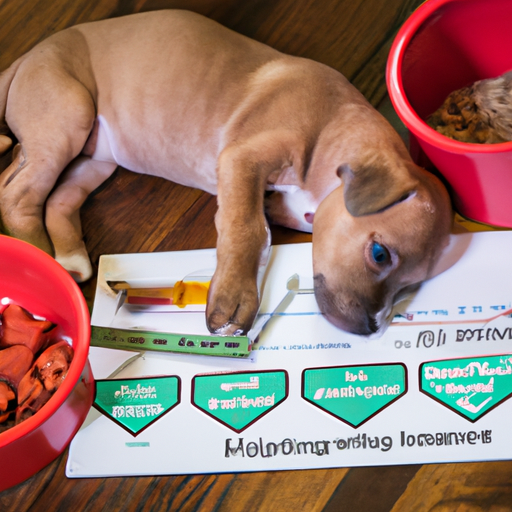Understanding Your Puppy’s Nutritional Needs
As a new puppy parent, it’s crucial to understand that your 10-week old puppy’s nutritional needs differ significantly from those of an adult dog. At this tender age, they’re in a rapid growth phase and require a diet rich in proteins, vitamins, and minerals to support their development.
- Proteins: They’re essential for tissue repair and muscle development. The Association of American Feed Control Officials (AAFCO) recommends a minimum of 22% protein for growth and reproduction in puppies.
- Fats: Fats provide the most concentrated source of energy for your puppy. They also aid in vitamin absorption and promote healthy skin and coat.
- Carbohydrates: While dogs don’t necessarily need carbohydrates, they provide extra energy and fiber, which aids in digestion.
Always ensure you’re feeding your puppy a balanced diet that adheres to these nutritional needs.
How Much to Feed Your 10-Week Old Puppy
Now, how much should you actually feed your 10-week old puppy? Most vets recommend feeding them about 5% of their body weight spread across four meals a day. This is just a general guideline though, and actual feeding amounts can vary based on your puppy’s breed, size, and activity level. Here’s a simple table to give you an idea:
| Puppy Size | Daily Food Intake |
|---|---|
| Small (1-10 lbs) | 1/2 – 1 cup |
| Medium (10-25 lbs) | 1 – 2 cups |
| Large (25-50 lbs) | 2 – 4 cups |
| Giant (50+ lbs) | 4+ cups |
Choosing the Right Puppy Food
It’s not just about the amount you feed your puppy, but also the quality of food. Always choose a brand that’s specially formulated for puppies, preferably one that’s approved by the AAFCO. Look for labels that say ‘complete and balanced’, which indicates that the food contains all the necessary nutrients your puppy needs to grow.
Here are some key factors to consider:
- Ingredients: The first ingredient should be a high-quality source of animal protein (like chicken, beef, or fish).
- Nutrient Profile: Ensure it meets the AAFCO’s guidelines for growth and reproduction (22% protein and 8% fat).
- Brand Reputation: Choose a reputable brand that invests in nutritional research and quality control.
Monitoring Your Puppy’s Weight
Monitoring your puppy’s weight is an integral part of ensuring they’re getting the right amount of food. Regular vet check-ups will help you keep track of their growth and adjust their food intake accordingly.
Remember, overfeeding can lead to obesity and other health issues. On the flip side, underfeeding can impede your puppy’s growth and development. So, it’s all about finding that perfect balance.
Transitioning to Adult Dog Food
When your puppy reaches about 80% of their expected adult size, it’s time to start transitioning them to adult dog food. This usually happens around 12 months for small breeds and up to 24 months for larger breeds. The transition should be gradual, over a period of 7-10 days, to avoid upsetting your puppy’s stomach.
FAQ
Q: How do I know if I’m overfeeding or underfeeding my puppy?
A: Overfed puppies might display symptoms like bloating, excessive weight gain, and loose stools. Underfed puppies, on the other hand, might have a visible ribcage, low energy levels, and stunted growth. If you notice any of these signs, consult your vet.
Q: Should I free-feed my puppy?
A: Free-feeding, or leaving food out all day, can lead to overeating and obesity. It’s recommended to stick to a fixed feeding schedule.
Q: Can I feed my puppy human food?
A: While some human foods are safe for puppies, many are not and can even be harmful. Always consult your vet before introducing human food into your puppy’s diet.
Q: When should I switch my puppy to two meals a day?
A: Typically, you can start feeding your puppy two meals a day when they reach about six months of age, but it can vary depending on the breed and size of your dog. Always consult with your vet to determine the best feeding schedule for your puppy.
Remember, every puppy is unique and their dietary needs can vary. Always consult with your vet to determine the best feeding plan for your furry friend. Happy feeding!



